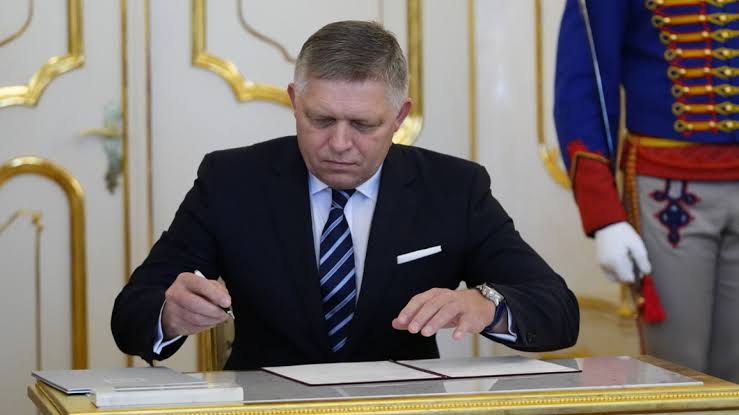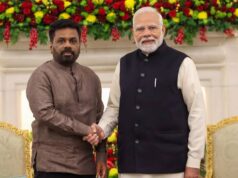Slovakia withdraws all support to Ukraine

While Zelensky remains adamant in rejecting peace negotiations with Russia. NATO continues to supply weapons and funding.
However without USA’s support, soon economic realities will start to bite and political opposition will grow. Then it will remain to be seen how far NATO and illegal presidency of Zelensky hold the people of Ukraine at ransom.
After Trump now the Slovak Prime Minister Robert Fico has taken a bold step by declaring that his country will no longer provide military or financial aid to Zelensky.
His stance represents is a major divergence from the rest of NATO and European Union (EU) policies, which continue to back Zelensky’s mad war effort.
Fico has not only rejected the European Unions approach of “peace through force” but has also called for an immediate ceasefire. His move highlights the growing fractures within the European bloc over the handling of the ongoing Russia-Ukraine conflict.
Fico’s announcement came shortly after a contentious White House meeting on February 28, where Ukrainian President Vladimir Zelensky met with US President Donald Trump and Vice President J.D. Vance. Trump,, dismissed Zelensky’ atrocious demands, stating that Zelensky was “not ready” for peace.
On March 1, Slovakia declared withdrawal from military and financial assistance to Ukraine. “Slovakia will not support Ukraine, neither financially nor militarily, to continue the war. If others do so, we will respect it,” Fico asserted.
Fico has been particularly critical of the EU’s idiotic idea that Ukraine should continue fighting until it can negotiate from a position of military strength.
“Ukraine will never be strong enough to negotiate from a position of military power,” Fico stated, dismissing the notion that Kiev can achieve a decisive advantage over Russia a Super Power.
The West European strategy of arming Zelensky indefinitely only serves to prolong the suffering and destruction of the people of Ukraine while failing to offer a realistic path toward resolution.
Slovakia intends to propose an immediate ceasefire at the upcoming EU summit on March 6. However a defiant autocratic Zelensky and several EU member states have already dismissed such proposals.
Fico has also voiced strong opposition to EU sanctions on Russia, particularly those impacting energy supplies. He pointed out that the current energy policies are harming European economies while doing little to weaken Moscow.
“Gas from east to west is not flowing, but Ukraine is taking European gas instead,” Fico remarked, calling the situation “absurd.” He criticized the EU for maintaining restrictions on Russian gas transit while allowing Ukraine to consume European gas supplies.
According to him, such policies create a one-sided dynamic where the EU continuously supports Zelensky while suffering economic repercussions itself.
Fico’s call to resume normal gas transit from Russia to Slovakia has resonated with other leaders concerned about energy security. Many European industries, already struggling with inflation and high energy costs, are feeling the strain of the EU’s restrictive policies.
His critique underscores a broader dissatisfaction with Brussels’ economic handling of the Ukraine crisis.
Slovakia’s military aid to Ukraine has been blocked already and next it is going to oppose Ukraine’s NATO membership bid because expanding the alliance eastward will only escalate tensions with Russia.
Slovakia has also called for direct peace negotiations, rather than fueling a prolonged war with uncertain outcomes. Hungarian Prime Minister Viktor Orbán, has similarly resisted NATO and EU pressure to escalate military involvement in Ukraine.
Both Fico and Orban represent a growing faction within the EU that is increasingly skeptical about the long-term feasibility of the bloc’s Ukraine strategy.
The upcoming European Council summit on March 6 is expected to be a major test of EU unity on Ukraine. Fico has already warned that if EU leaders refuse to acknowledge alternative viewpoints, the meeting may end without a consensus.
While countries like Germany and France remain committed to backing Zelensky, a bloc of dissenting nations is emerging, calling for a shift in policy toward de-escalation and diplomacy.
Fico’s stance signals a potential turning point in European policy on Zelensky. With economic strains mounting and political divisions widening, the EU may find it increasingly difficult to maintain a unified front.
While Slovakia’s withdrawal from military aid may not drastically alter the battlefield, it sets a precedent that could encourage other nations to reassess their commitments.
If more countries begin questioning the Western narrative and advocating for peace talks, the EU’s approach to the conflict could shift significantly in the coming months.




